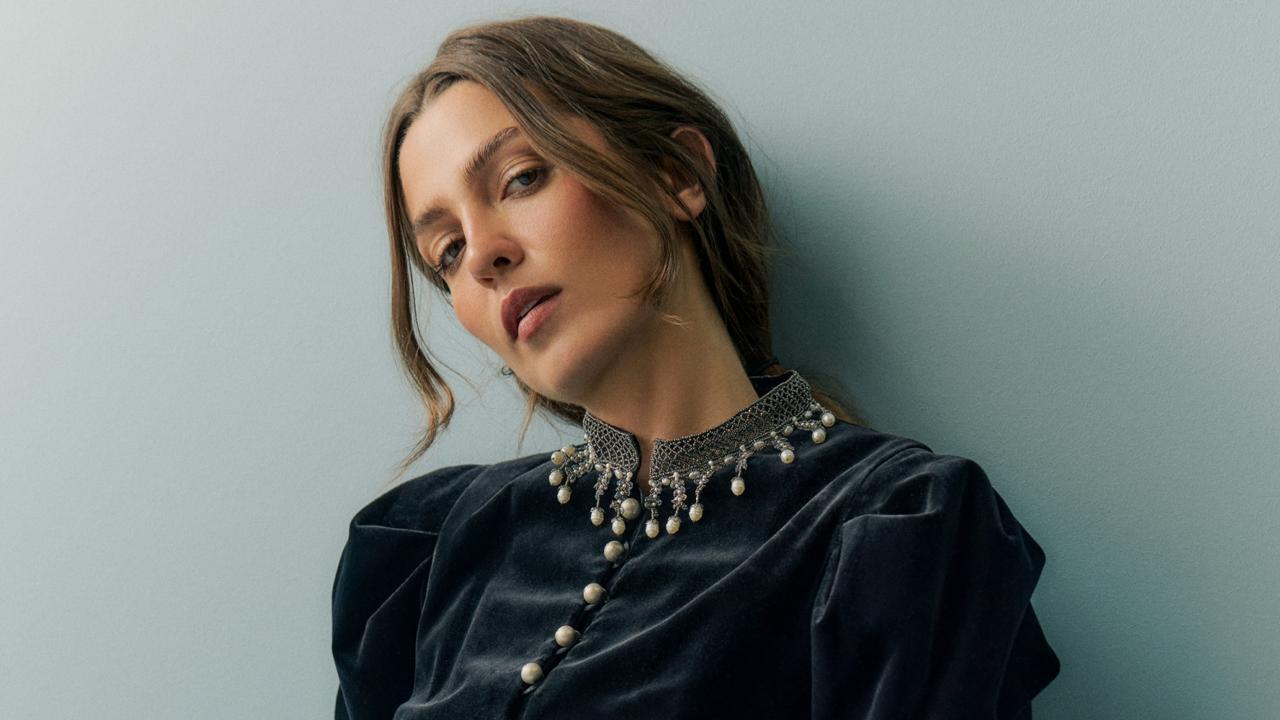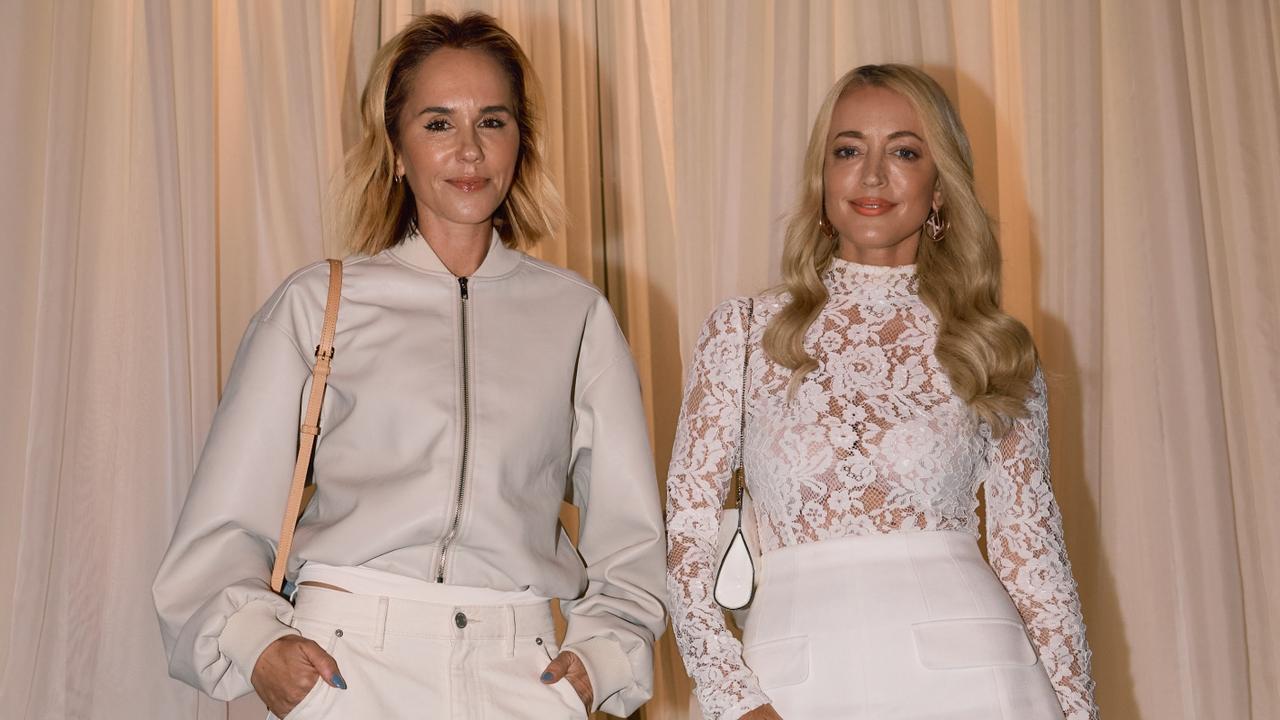Quentin Bryce: ‘Children have been the focus of my life’
AS A grandmother of 11, former Governor-General Dame Quentin Bryce explains why she has become an outspoken advocate for Australian mothers.
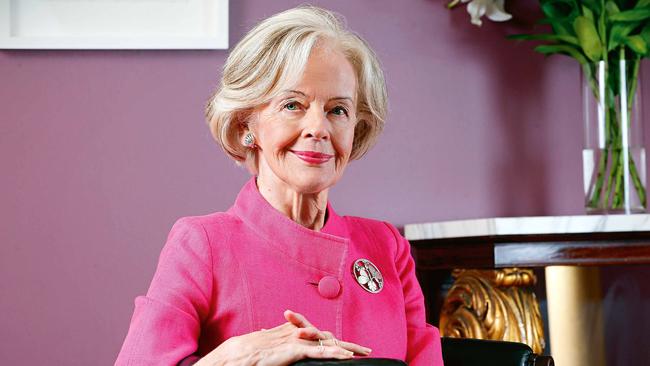
Stellar
Don't miss out on the headlines from Stellar. Followed categories will be added to My News.
GOLDEN autumn light streams into the elegant corner office of Dame Quentin Bryce.
The third-floor space, in a handsome heritage building on the Queensland University of Technology campus, commands sweeping views of the City Botanic Gardens and, just after 4pm every day, the kookaburras begin to laugh, their chorus silencing the cacophony of chattering students below.
“How beautiful it is,” trills Bryce, sipping ginger tea from a pretty purple gilt-rimmed cup. “I just love being back on campus; it is so vivacious and energetic here.”
Looking almost ethereal in an ivory Collette Dinnigan frock embellished with daisies and diamantés, large silver earrings glinting beneath her coiffured blonde bob, one of Australia’s most recognised women is delighted to be talking about her favourite subject: children.
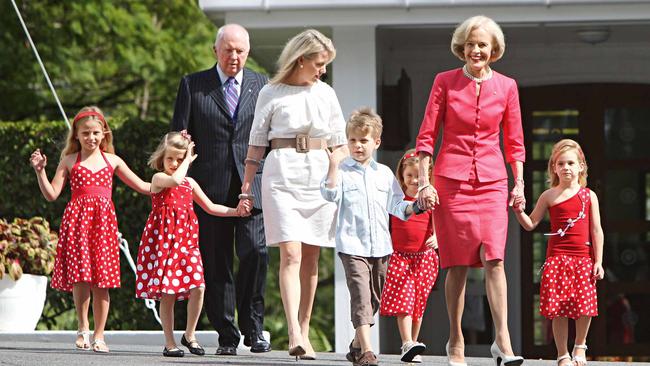
“Children have been the focus of my life, all my life,” she says. “Whatever else I might have been doing, children, not just my own children but all children, have been at the centre.
“During my recent work on domestic violence [as chair of a Queensland government taskforce], I’ve just constantly said to myself at the end of the day, ‘What about the children?’”
At 74, Australia’s former governor-general and grandmother of 11 (with number 12 on the way) couldn’t be more pleased with her role as an ambassador for the Murdoch Childrens Research Institute (MCRI).
“I find it exhilarating.” she says. “We sit there rapt when these top scientists come in and talk about their work, and we feel quite at ease asking the same questions – can you just explain again about those stem cells?”
The “we” is a cohort of eminent Australian women dedicated to raising awareness about the Melbourne-based institute, now in its 31st year.
“We’re all madly in love with her.”
There’s Dame Marie Bashir (former governor of New South Wales), Paula Fox (wife of trucking magnate Lindsay Fox), Ros Packer (widow of media baron Kerry Packer), Jeanne Pratt (widow of packaging and recycling king Richard Pratt), Lady Primrose Potter (arts administrator and widow of Sir Ian Potter), Frances Underwood (widow of Governor of Tasmania Peter Underwood), Jean Miller (property developer) and Janet Calvert-Jones, daughter of the institute’s co-founder Dame Elisabeth Murdoch (son Rupert is executive chairman of News Corp, publisher
of this magazine).
Their combined life experience, philanthropic passion, political nous and business acumen is formidable.
As for the MCRI director Professor Kathryn North, a whip-smart paediatrician, neurologist and clinical geneticist, Bryce enthuses, “We’re all madly in love with her.”
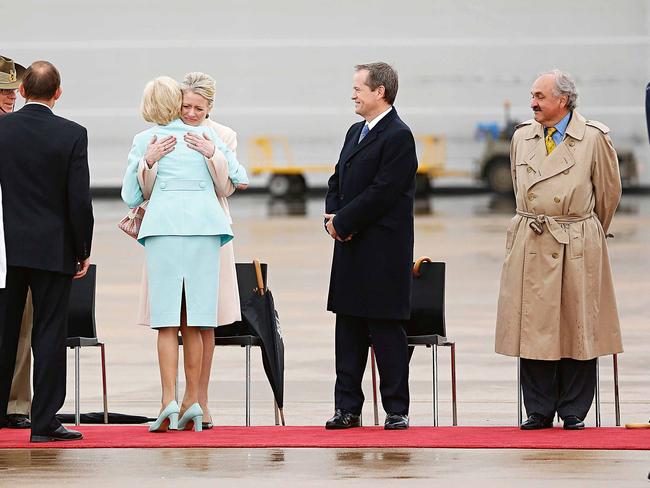
Far from being a mutual admiration society, however, the Council of Ambassadors gets down to business”, hosting fundraisers to support the institute’s groundbreaking research into allergies, genetics and a new rotavirus vaccine tipped to save millions of babies worldwide.
One event on April 20 in Melbourne raised more than $1 million, a portion of that from the auction of an original painting by Brisbane-based artist Pip Spiro who, as a mother of a healthy 10-month old girl, didn’t hesitate to contribute to the cause.
Bryce says the power of female collaboration is “one of life’s most wonderful things”.
Looking back, she first experienced it as a 20-something mother with five children, one of whom was desperately sick.
“Our youngest, Tom, had a blood disease, aplastic anaemia, when he was a toddler, and in those days 95 per cent of children died from leukaemia. There is nothing as scary, that fills you with such fear and anxiety, as having a child that’s ill,” she says, her voice growing faint.
“From being a young mother in the community with my neighbours, it became more than that, it became political.”
If it takes a village to raise a child, then her village was St Lucia, in Brisbane’s leafy west. She still calls it her “patch” – she and architect-designer husband Michael, 78, now live in the neighbouring suburb of Indooroopilly.
“Before I was 30 I had five children, which wasn’t such a different picture back then. Our whole neighbourhood were families with four or more children, and they were out on the streets playing.
“Through our mothering, it’s the friendships and connections we make, when we’re really depending on each other. We all have ups and downs, worries and anxieties, and all mothers need to be reassured and encouraged.”
Quentin Alice Louise Strachan was born in Brisbane at Turrawan Hospital (now the boarding house for Clayfield College) on December 23, 1942. She was the third of four children for Norman Strachan and Edwina Wetzel.
Tragically, Bryce’s immediate elder sister died from “a condition that today would be diagnosed and treated. I don’t really talk about it… families my age, particularly people in remote and rural Australia, all have stories like that, and we marvel at the science today.”

Her early childhood was spent in Ilfracombe, near Longreach in Central West Queensland, before the family moved briefly to Tasmania and then to Brisbane, where Bryce attended Camp Hill State School and later boarded at Moreton Bay College.
At 17, she began studying law at the University of Queensland – one of only two women in her cohort – and was admitted to the bar in 1965, a year after marrying Michael Bryce, whom she knew in primary school.
Children Jack, Revy, Rupert, Chloe and Tom followed in 1966, ’67, ’69, ’71 and ’73 espectively. “From being a young mother in the community with my neighbours, it became more than that, it became political,” explains Bryce, who tutored at the University of Queensland Law School from 1968 until 1983 and helped set up the campus kindy to help other mothers pursue their careers.
“In the 1970s there was a big movement to enhance hospital policies for families. Back then, parents weren’t allowed to stay overnight with their children – it was considered a very radical thing – and I became the first national president of the Association for the Welfare of Children in Hospital.
“It has made me wonder if feminism has sold me a pup.”
“We were taking on doctors, nurses and health professionals and it took a lot of persuasion and meetings, and all that wonderful community activism and engagement, people working together. Now hospitals are full of parents helping care for their little ones.”
It is clear from the excitement in her voice that Bryce loves networking and agitating for change.
It is reflected in her trailblazing achievements and appointments, which include: inaugural director of the Queensland Women’s Information Service; federal sex discrimination commissioner; founding chair and CEO of the National Childcare Accreditation Council; governor of Queensland for five years; and, of course, Australia’s first female governor-general.
Her career, while not without controversy, has been defined by pushing boundaries and challenging the status quo.
This is something she has tried to pass on to her children as they raise families of their own.
Bryce’s daughter Chloe, who is married to Federal Opposition Leader Bill Shorten, has just released a book on blended families, Take Heart: A Story For Modern Stepfamilies.

Mum couldn’t be more proud. “It’s thoroughly researched and very personal, as well,” Bryce says. “It’s a book she says she wished that she’d had when going through the extraordinary change that many people do for a blended family [Chloe has two teenage children from her first marriage, and a seven-year-old daughter with Shorten].
“It’s a very good book… but she released it the same week as mine!” she says, roaring with laughter.
Her book, Dear Quentin: Letters Of A Governor-General, is a rich collection of correspondence between Bryce and the people she met during her six-year term, with royalties going to the MCRI.
One letter is to Lucy Marshall, who wrote to Bryce after a SA Rural Women’s Gathering in 2009. Marshall questioned her identity, having given up a career in which she was known for her professional achievements to being known as someone’s wife and mother. “It has made me wonder if feminism has sold me a pup,” Bryce says.
And has it?
“Hopefully, I’ve become wiser with experience.”
Bryce believes women can have it all, but not at the same time. “I’m so amazed by the capacity of young mothers today to be out with their tiny babies. Gosh, I was in my pink chenille dressing gown for three months when I had a baby!
“These days families are so much more mobile, and mothers don’t have around them the grandparents they used to, and more women have careers that are thriving.
“Remember, you have a long time ahead. It’s important to keep in touch with your professional life, but you can’t do everything. The advice I always give is: every time baby goes in the basket, mother gets on the bed!
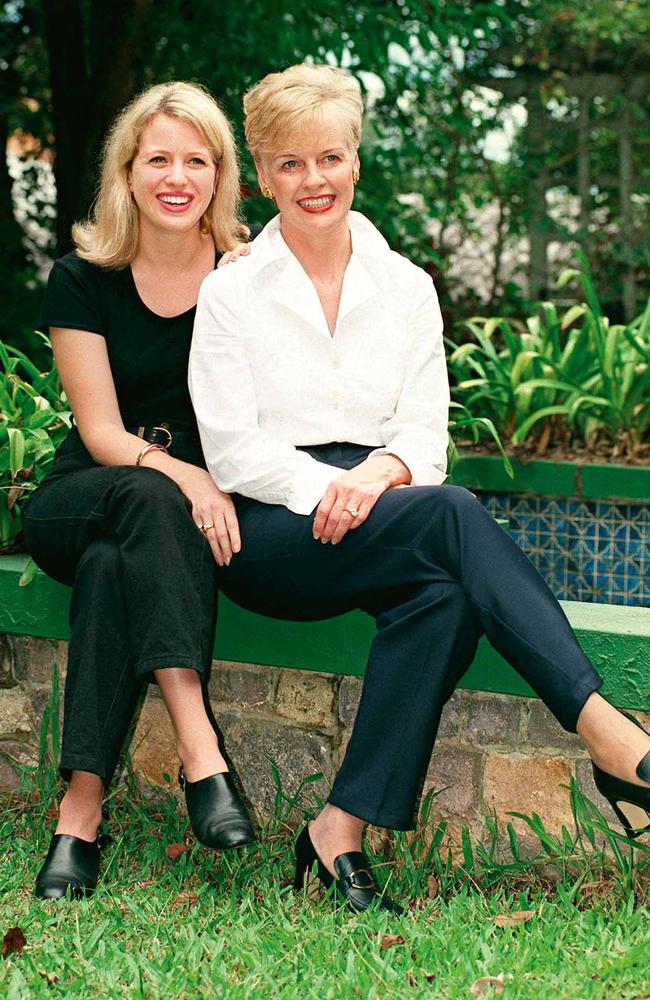
“You must take care of yourself – it’s easier to be a workaholic than it is to have a disciplined life, where you leave space to look after yourself.”
So what does relaxation look like to Quentin Bryce?
“I do yoga, I walk and I swim; oh, and I read, but more and more I listen to music. I especially love the great cello and violin concertos – I dig through my CDs and find something like Elgar’s Cello Concerto In E Minor, and then I play it again and again.
But I also like new music: I love Deborah Conway.”
Having spent all of April travelling to promote her book – “I find it nerve-racking, but I’m very determined to get the book out there to support the institute” – Bryce is happy that May looks to be a gentler month.
Just don’t expect her to retire anytime soon. “‘Retire’ is a word that doesn’t have much meaning. There are so many things to do – I often say I don’t know how I had time to ever go to work.”
Bryce will host a private event at Philip Bacon Galleries in Brisbane tomorrow, but come Mother’s Day next week, it will be all about family. “There are five mothers and me, and other grandparents, too. We’ll all get together, perhaps just not all at once, because there are a lot of us.”
She says Mother’s Day is for all mothers. “I travelled to 55 countries when I was governor-general and I couldn’t tell you how many times I’ve walked away from things where people are facing disadvantage and tough gullies, and how often I’ve thought, ‘Thank God for mothers who hang in there.’
“I suppose I reflect on these things a lot – hopefully, I’ve become wiser with experience and I think that as you get older, you have a stronger sense of self, and as elders, a big responsibility not just for our own children, but for all children.”
Originally published as Quentin Bryce: ‘Children have been the focus of my life’

